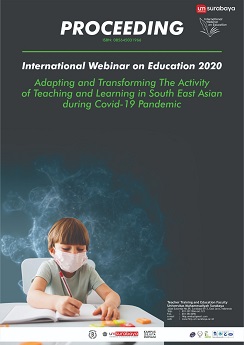Self-efficacy of mathematics students‟ on e-learning during covid 19 pandemic
Abstrak
Abstract.
This research aims to describe the self-efficacy profile of students majoring in
mathematics education in e-learning during the covid-19. The research subjects were 98 students of IAIN Metro mathematics semester 2, 4 and 6 who took part in e-learning. Students complete the self-efficacy questionnaire and interview guidelines. The results showed that 5.10% of students had very high self-efficacy, 28.57% high, 38.78% moderate, 21.43% low, and 6.12% very low. Furthermore, interviews were conducted with 6 students with high, medium and low self-efficacy criteria. The interview results show that students with high and moderate efficacy are feeling optimistic in carrying out online learning while students with low efficacy feel not optimistic in carrying out online learning. Their efforts have not been optimal due to several obstacles so they are not sure they can reach the learning target optimally. Students with high, moderate, and low self-efficacy have not been able to understand difficult lecture material through online learning. However, they always try to complete the task on time.
Referensi
N. R. Siregar, ―Persepsi Siswa Pada Pelajaran Matematika: Studi Pendahuluan Pada Siswa yang Menyenangi Game,‖ Pros. Temu Ilm. X Ikat. Psikol. Perkemb. Indones., pp. 224–232, 2017.
I. B. Putridayani and S. Chotimah, ―Analisis Kesulitan Belajar Siswa Dalam Pelajaran Matematika Pada Materi Peluang,‖ Maju, vol. 7, no. 1, pp. 57–62, 2020.
S. N. S. Wahid, Y. Yusof, and M. R. Razak, ―Math Anxiety among Students in Higher Education Level,‖ Procedia - Soc. Behav. Sci., vol. 123, pp. 232–237, 2014.
E. Novak and J. L. Tassell, ―Studying preservice teacher math anxiety and mathematics performance in geometry, word, and non-word problem solving,‖ Learn. Individ. Differ., vol. 54, pp. 20–29, 2017.
A. Bandura, Social foundations of thought and action: A social cognitive theory. PrenticeHall series in social learning theory. Englewood Cliffs, NJ: Prentice-Hall, 1986.
A. Bandura, Self-Efficacy: The Exercise of Control. New York, NY: W. H. Freeman, 1997.
B. J. Zimmerman, Self-Efficacy and Educational Development. In A. Bandura (Ed.). Selfefficacy in changing societies (pp. 202–231). Cambridge, UK: Cambridge University, 1995.
F. Pajares and J. Kranzler, ―Self-efficacy beliefs and general mental ability in mathematical problem-solving,‖ Contemporary Educational Psychology, vol. 20, no. 4. pp. 426–443, 1995.
M. Tschannen-Moran, A. W. Hoy, and W. K. Hoy, ―Teacher efficacy: Its meaning and measure,‖ Rev. Educ. Res., vol. 68, no. 2, pp. 202–248, 1998.
D. Jamaluddin, T. Ratnasih, H. Gunawan, and E. Paujiah, ―Pembelajaran Daring Masa Pandemik Covid-19 Pada Calon Guru : Hambatan, Solusi dan Proyeksi,‖ 2020.
M. Sobri, N. Nursaptini, and S. Novitasari, ―Mewujudkan Kemandirian Belajar Melalui
Pembelajaran Berbasis Daring di Perguruan Tinggi pada Era Industri 4.0,‖ J. Pendidik. Glas., vol. 4, no. 1, 2020.
Budiyono. 2003. Penilaian. Surakarta: UNs Press
Sugiyono. (2008). Metode penelitian pendidikan. Bandung: Alfabeta.
Azwar, S. (1996). Tes prestasi fungsi pengembangan pengukuran prestasi belajar. Yogyakarta: Pustaka Pelajar.
Michael, Allen. 2013. Micchael Allen‘s Guide to E-Learning. Canada: John Wiley & Sons.
Ardiansyah, Ivan. 2013 ―Eksplorasi Pola Komunikasi dalam Diskusi Menggunakan Moddle pada Perkuliahan Simulasi Pembelajaran Kimia‖. Bandung: Universitas Pendidikan Indonesia.
N. Hayati, ―Metode Pembelajaran Daring/E-Learning Yang Efektif A. Pendahuluan Sejarah Elearning,‖ Apr. 2020.
M. Yusuf, ―The impact of self-efficacy , achievement motivation , and self- regulated learning strategies on students ‘ academic achievement,‖ Procedia - Soc. Behav. Sci., vol. 15, pp. 2623–2626, 2011.
S. Maskar and E. Wulantina, ―Persepsi Peserta Didik terhadap Metode Blended Learning dengan Google Classroom,‖ vol. 1, no. 2, pp. 110–121, 2019.
F. Fajares, ―Self-Efficacy Beliefs and General Mental Ability in Mathematical ProblemSolving.






